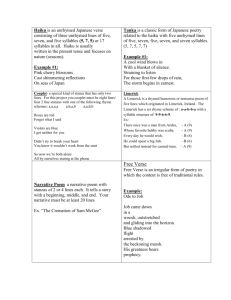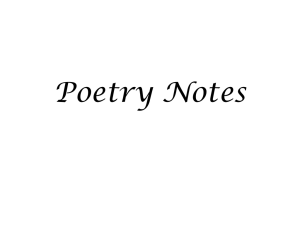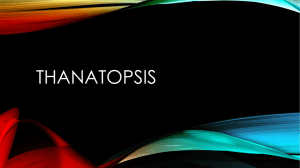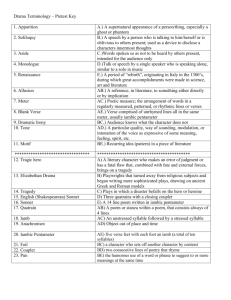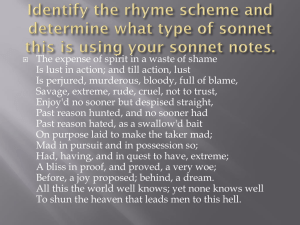Poetry PowerPoint Revised
advertisement
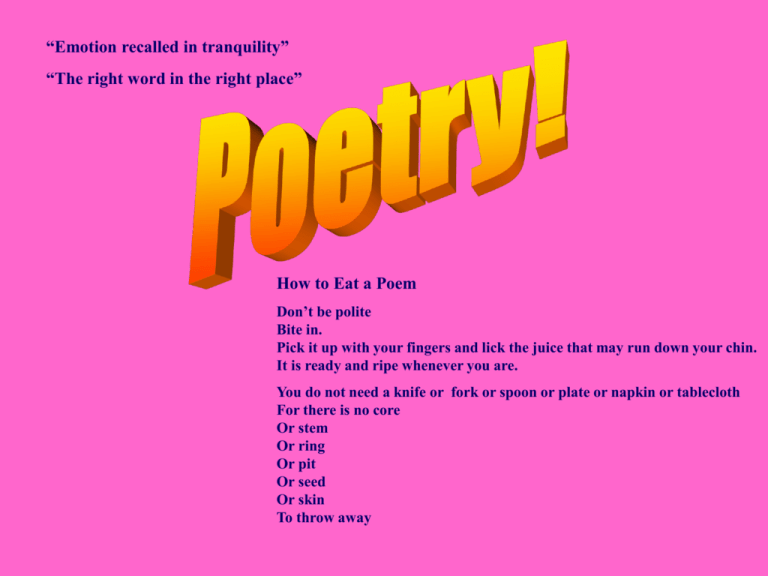
“Emotion recalled in tranquility” “The right word in the right place” How to Eat a Poem Don’t be polite Bite in. Pick it up with your fingers and lick the juice that may run down your chin. It is ready and ripe whenever you are. You do not need a knife or fork or spoon or plate or napkin or tablecloth For there is no core Or stem Or ring Or pit Or seed Or skin To throw away Terms to know: Metre – “the measured pulse of poetry” - deals with the regular or irregular pattern of feet Foot – a metrical unit in poetry; an accented syllable with accompanying syllable or syllables. Rhythm – measured flow of repeated sound patterns Eg.IAMBIC PENTAMETRE (light/heavy), trochaic (heavy/light) “ But soft! What light through yonder window breaks?” (5 feet, each consisting of two syllables, iambic rhythm) Syntax – the order of the words. FICURES OF SPEECH: •Simile – a comparison of unlike things using “like” or “as” Eg. Her face turned as white as chalk. She voice is like a finely tuned violin. •Metaphor – a comparison of two unlike things without using “like” or “as” Her fears was revealed by her chalky cheeks Her violin voice soothed the children. •Personification – giving human characteristics to inanimate objects or non living beings. Eg. The sun smiled on our picnic! POETIC / LITERARY DEVICES: •Allegory – a poem which may be read on two levels; the poet is suggesting “By this I mean that”. Allegories usually have a moral or didactic purpose, which is conveyed by symbols, symbolic characters, or symbolic incidents. •Allusion – a reference to someone, something with which the author assumes the reader will be familiar. May be historical, literary, mythical, religious etc. Apostrophe – addressing the absent as though present Eg. Oh Sun, shine your rays on me Pun – a play on words (double meaning).“When my car gets old I will retire it” HAHaHa! Epigram – a very short, polished, terse verse often with a witty ending Eg. Swans sing before they die—’twere no bad thing Should certain people die before they sing. Coleridge Euphemism – a polite way of saying something harsh or distasteful Eg. “Comfort station” instead of toilet. Hyperbole – an exaggeration for effect Eg. I’ve told you that a million times. Oxymoron – a contradiction in terms, usually an adjective followed with a contrasting noun Eg. Silent scream, freezing fire Paradox – an apparently contradictory statement which, upon reflection, expresses a truth Eg. The child is father of the man. Symbolism – a concrete object is used to suggest abstract ideas. Transferred Epithet – (an epithet is a term characterizing something. Eg. “brave Macbeth) - a transferred epithet is an adjective modifying a noun not usually associated with it. Eg. Cold war, happy tree ALLITERATION – the same sound is used to begin words in succession. Eg. Caroline kicked the Christmas cake! ASSONANCE – the contained vowel sound of successive words is the same. Eg. Green leaf, hope floats, brain flamed, sand castle, high tide CONSONANCE – the repetition of two or more consonants, but with a change in the intervening vowel. Eg. Live – love, pitter – patter, horror – hearer - repeating consonants in any position. Eg. Crawl with legs (L’s) Thunder without lightning (TH’s) ONOMATOPOEIA – the sound of the word imitates the sound of the action. Eg. Swoosh, murmur, hiss, burp EUPHONY – an agreeable combination of sounds. Eg. Numerous marigolds shone beside the babbling brook. CACOPHONY – a disagreeable combination of sounds. Eg. Coarse, cackling laughter characterized the snarling, sinister serviceman! • Prose: – – – – – – Literal, concrete States Clear and straightforward Standard sentence structure, proper punctuation How the passage sounds is secondary Prose comes from the brain • Poetry: – – – – Figurative, abstract Suggests Can be ambiguous No regular sentence structure, little or no punctuation – Sound is key – Poetry comes from the heart • • • • • • The quality or impressiveness or the importance of the thought expressed. The emotional effects of the passage and how they are created The effective use of imagery or colour or sound patterns. The effects of particular figures of speech and/or poetic devices. The kind of diction and the effect of its use. The merits of the verse form and rhyme scheme and the rhythm and melody of the language The merit under discussion should be named, illustrated from the text of the poem and, if possible, commented on as to the effectiveness or result Types of Poetry: Ballad A short narrative poem with stanzas of two or four lines and usually a refrain. The story frequently deals with folk-lore or popular legends. Written in straightforward verse, seldom with detail, but always with graphic simplicity and force. Most ballads are suitable for singing and, while sometimes varied in practice, are generally written in ballad meter, i.e., alternating lines of iambic tetrameter and iambic trimeter, with the last words of the second and fourth lines rhyming. Haiku Pink cherry blossoms Cast shimmering reflections On seas of Japan Haiku is an unrhymed Japanese verse consisting of three unrhymed lines of five, seven, and five syllables (5, 7, 5) or 17 syllables in all. Haiku is usually written in the present tense and focuses on nature (seasons). There is much more to haiku than the made up 5/7/5 version. Limerick A Limerick is a rhymed humorous or nonsense poem of five lines which originated in Limerick, Ireland. The Limerick has a set rhyme scheme of : a-a-b-b-a with a syllable structure of: 9-9-6-6-9. The rhythm of the poem should go as follows: Lines 1, 2, 5: weak, weak, STRONG, weak, weak, STRONG, weak, weak, STRONG, weak, weak Lines 3, 4: weak, weak, STRONG, weak, weak, STRONG, weak, weak This is the most commonly heard first line of a limerick: "There once was a man from Nantucket." Epic An epic is a long narrative poem celebrating the adventures and achievements of a hero...epics deal with the traditions, mythical or historical, of a nation. Examples: Beowulf, The Iliad and the Odyssey, and Aeneid. An ODE is a poem praising and glorifying a person, place or thing. An Ode To Dreamers When dreamers dream And lovers love Do they receive their visions From heaven above? Or do they originate Where all things start Within our minds Within our hearts? I know not all But what I do know is this You cannot build a Kingdom Upon a flimsy wish So believe in your dreams Follow them blind Lest you loose them all, To the hands of time.
